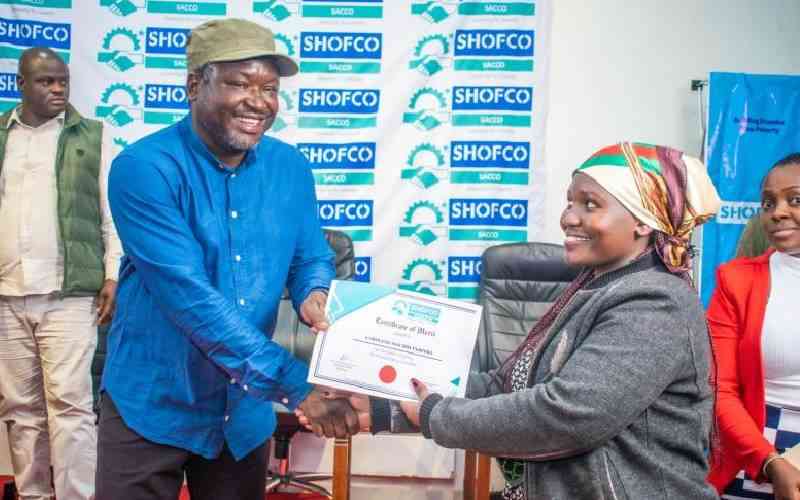 |
|
Grace Mumbi looks on as her cows feed at her home in Ngong. [Photo: Sophia Muthoni /Kajiado] |
By Sophia Muthoni
Kenya: Very few dairy farmers can boast of getting 90 litres of milk per day from five cows. But Grace Mumbi, 44, is doing just that. She started out with two dairy cows but now has five.
When The Counties visited Mumbi at her home in Ngong, she was in mud boots tending to her dairy cows. She has been practicing zero grazing for two years now and has never regretted her decision despite discouragement from peers.
“I carried out research to find out whether dairy farming in Ngong was viable. I work in Kinangop and most people discouraged me from starting a business if I would not be available to supervise it,” she told The Counties.
High demand
She also practiced dairy farming in Kinangop but said the business thrived better in Ngong.
She explained: “Demand for milk in Ngong is very high. I sell the fresh milk and yoghurt, which I make at home, to my neighbours. A litre of milk will goes for Sh60 and that of yoghurt is double that.”
Her zero grazing dairy business is proof that indeed space is not an issue for anyone looking to get into dairy farming.
The Counties noted that she is already expanding her barn for more dairy cows in the future.
“The area that is holding the cows is slightly under 40x80. The remaining three quarter acre that I have planted napier grass can actually hold another 72 cows and I intend to expand to that point,” she revealed to The Counties.
A Human Resource Manager by profession, Grace said her professional skills have come in handy to keep her business a float.
She explained: “I have learnt that one can do business even when they are away. The trick is to motivate your employees. I have two employees who look after things when I am away. They work with targets and keep records of income and expenditure. The cows make enough money to feed themselves, pay the workers and expand the business. I only spent my salary for the first six months but now the business is stable.”
She said her employees understand that if they meet their targets they will receive bonuses. The opposite also applies; if one does not meet set targets then the salary and benefits reduce.
Grace is however not keeping knowledge about the business to herself. She has mentored her workers to get into the business. She revealed most people she has worked with are young and fresh from university.
Stay informed. Subscribe to our newsletter
Taking challenges
“I like working with the youth because they like taking up challenges. Farming is not for the old and that is why I want to mentor the youth and show them that one does not always need an office job. These young people have businesses that are doing better than mine,” she said.
One of the challenges she faced while starting the business was financing. She told The Counties that commercial banks are a bit sceptic when told the money is for dairy farming. She turned to the government for help and was a great decision.
“My first loan was from Agricultural Finance Corporation (AFC). I also turned to a government body when it came to breeding my cows. I would encourage people to work with government when they want to venture into agriculture because it gives the best. The government carries out research and can tell why this seed is better than the next for example,” she explained.
Getting feeds she said, was another challenge forcing her to resort to making her own. All one needs to know are the correct ratios. The Counties learnt that one should be very careful with what the dairy cows are fed on.
“Cows are very sensitive, a slight change in their diet can lead to a drastic weight loss,” she added.
Her sons have also taken up interest in what she does and she is in the process of mentoring her first born who is currently at the university.
“I want him to mentor others like I have done. I plan to put up biogas plant big enough to distribute power to my neighbours,” she concluded.
 The Standard Group Plc is a
multi-media organization with investments in media platforms spanning newspaper
print operations, television, radio broadcasting, digital and online services. The
Standard Group is recognized as a leading multi-media house in Kenya with a key
influence in matters of national and international interest.
The Standard Group Plc is a
multi-media organization with investments in media platforms spanning newspaper
print operations, television, radio broadcasting, digital and online services. The
Standard Group is recognized as a leading multi-media house in Kenya with a key
influence in matters of national and international interest.
 The Standard Group Plc is a
multi-media organization with investments in media platforms spanning newspaper
print operations, television, radio broadcasting, digital and online services. The
Standard Group is recognized as a leading multi-media house in Kenya with a key
influence in matters of national and international interest.
The Standard Group Plc is a
multi-media organization with investments in media platforms spanning newspaper
print operations, television, radio broadcasting, digital and online services. The
Standard Group is recognized as a leading multi-media house in Kenya with a key
influence in matters of national and international interest.









